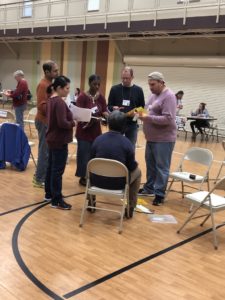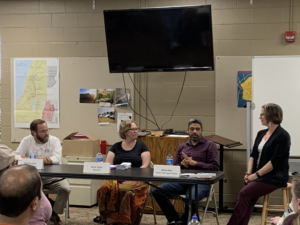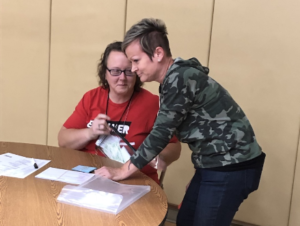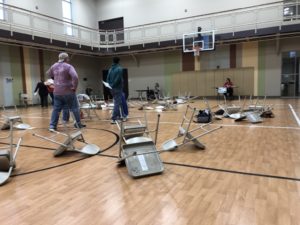
This year’s Class of 2020 participated in the annual Poverty Simulation put on by the YWCA and our very own Multicultural Leadership Program. This event is used every year to educate the public about what it is like for everyday families to live below the poverty line. Facilitators implement this by giving each participant a profile and grouping them into families in which they must work together to provide for themselves for a hypothetical four weeks. This includes buying food every week, paying off mortgages and loans, and going to work and school. Challenges that participants faced ranged from the inability to reach each station (like the bank or the store) in time before the ‘day’ ended, bureaucratic red tape, and a lack of knowledge regarding what to do and what services to go to when a crisis arose.

The simulation was successful in teaching about the sometimes endless and inescapable cycle of poverty, but the intent of this event is not to leave participants with a sense of hopelessness. The desire is to empower them to be able to help others and themselves if poverty takes hold of their lives. This year, for the first time, a panel was held consisting of representatives from different services in the Bloomington-Normal community. Matt Burgess came to talk about his non-profit Home Sweet Home Ministries, an organization that provides services like a shelter and a food coop for those struggling through poverty and homelessness. Adrian Barr from Prairie State Legal Services spoke about his organization which provides affordable legal services for those who cannot afford a private lawyer. And Anne Taylor represented Marcfirst which is an association that provides a community for those with disabilities and assists with gaining independence and work.
One observation that was made by the participants during the post-simulation debrief was the feeling of isolation and lack of community as an “every man for himself” mentality took over each family. The stress of trying to survive kept the families from being able to live in peace. Matt Burgess addresses this aspect in his definition of poverty: an absence of relationships that work. His organization’s goal is to fill this void in an individual’s life by creating a community in which the people they serve do not simply receive; rather, they participate in their own recovery. This attitude has been successful as 15% of their current employees are former clients.

A common roadblock in the simulation that brought a lot of distress to the participants was the bureaucracy at every level which included uncaring employees, institutional bias, and corruption. This made it all the more impossible to obtain your family’s necessities. Adrian Barr described a not-at-all-times fair legal system in which defendants cannot afford lawyers and past criminal records can bar someone from getting a job. Prairie State Legal Services assists their clients with affordable legal representation and expungement sealing which provides a freedom that helps their clients move forward in their lives.

A key theme that was brought up by our participants and the panelists is the lack of knowledge regarding the services that could have been available to them. A healthcare center was stationed in the simulation and no one went to it even though there were multiple pregnant women and disabled individuals. Anne Taylor specifically talked about ways to advertise services; Marcfirst, for example, holds monthly meetings open to the public to present their various programs. Other solutions were addressed which included a centralized physical location of all social service providers to make them more known and easily accessible– a one stop shop if you will. The empty Empire Crossing Mall was suggested to fulfill this need, somewhat jokingly, but the idea stands that, however unattainable it may be, this concept would make certain services more known and would alleviate the burden of transportation. This concept, however, does exist–just not in physical form. PATH was referred to frequently; it is a hotline that can be reached 24/7 just by dialing 211. A volunteer with extensive knowledge about social services in Bloomington-Normal will be on the other end to direct callers to the best provider for their needs.
After taking part in, as one participant put it, “a really good experience, being in someone else’s shoes,” the Class of 2020 has gained a new perspective that will help them as they continue to work as leaders within the community.